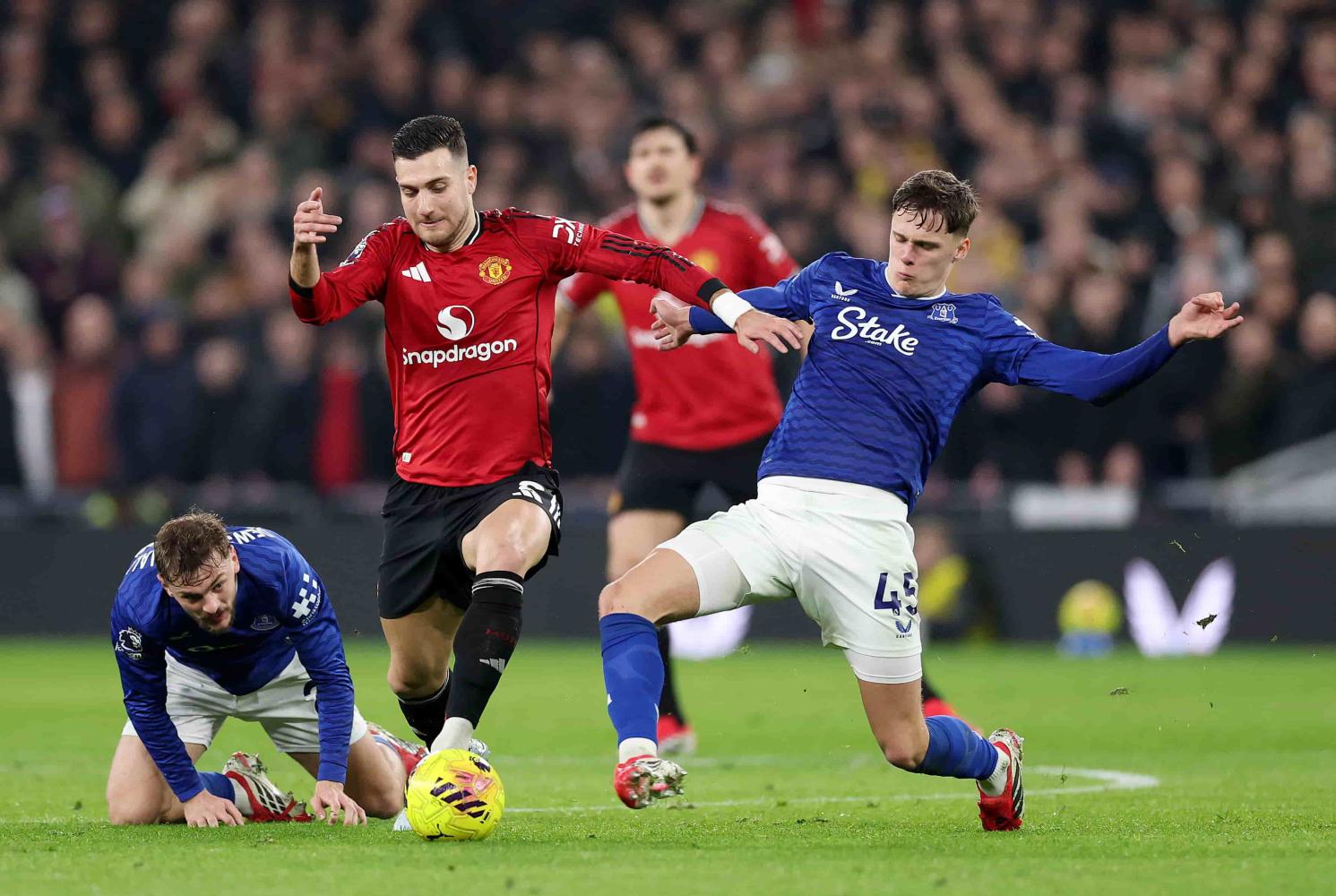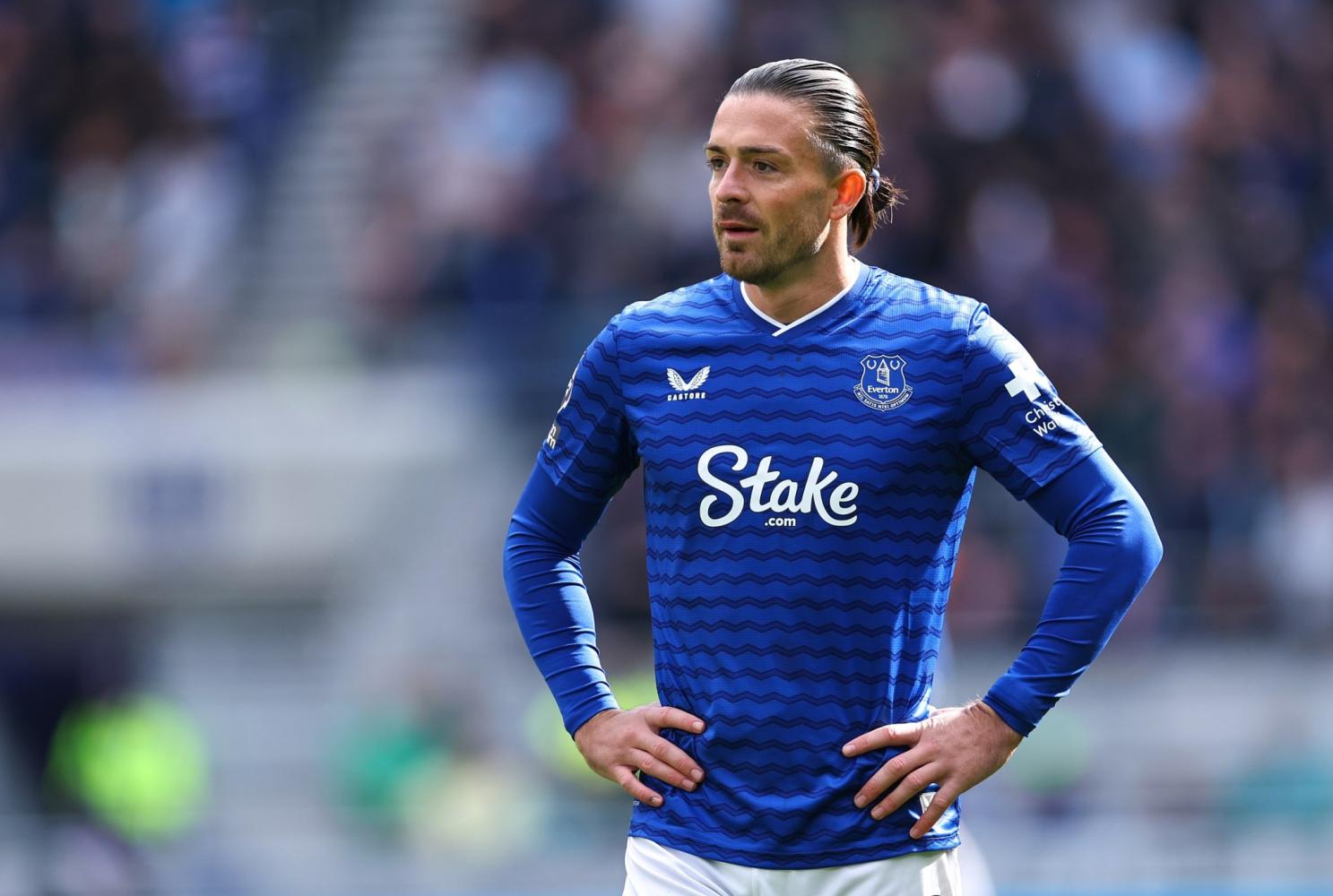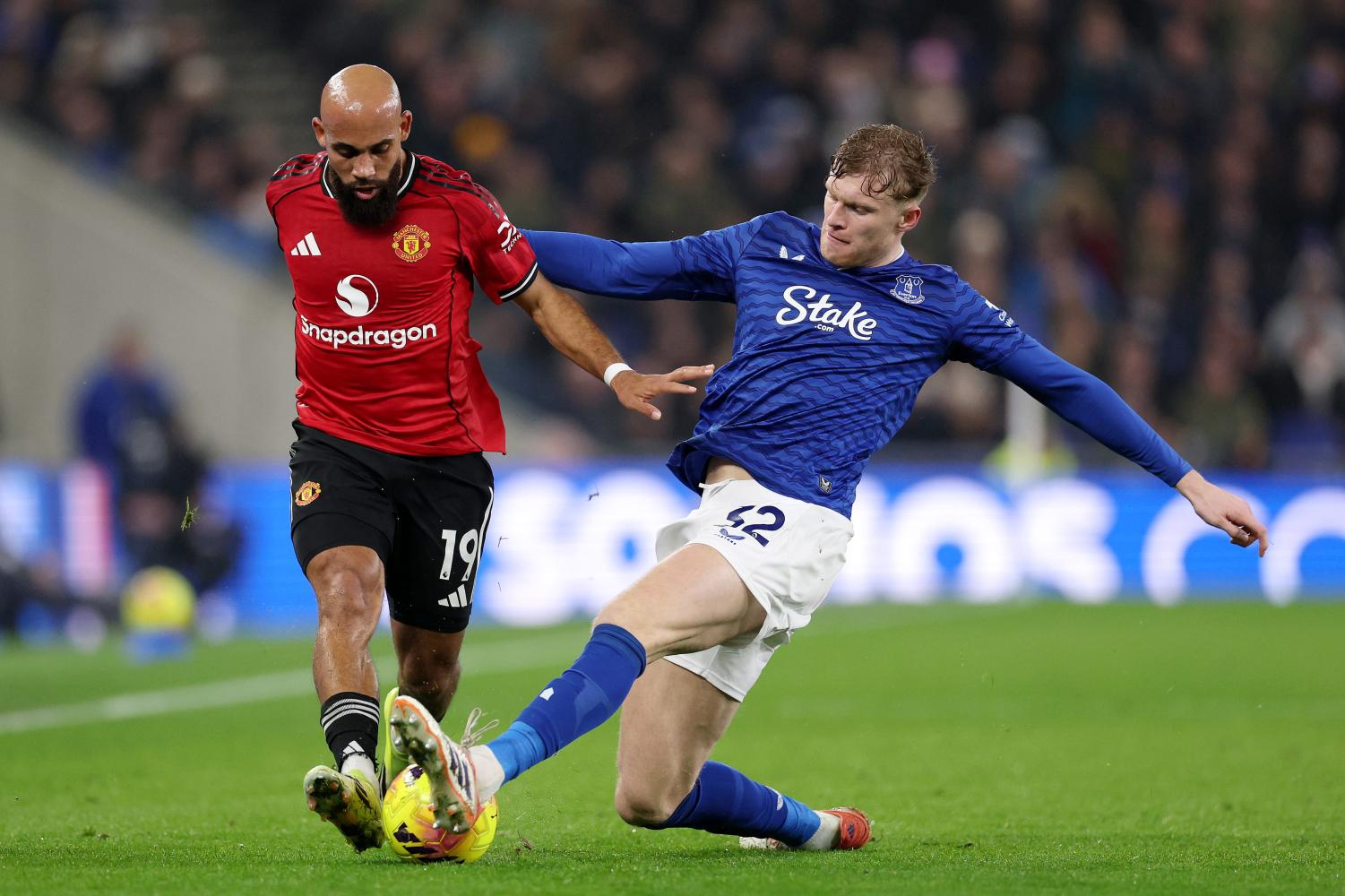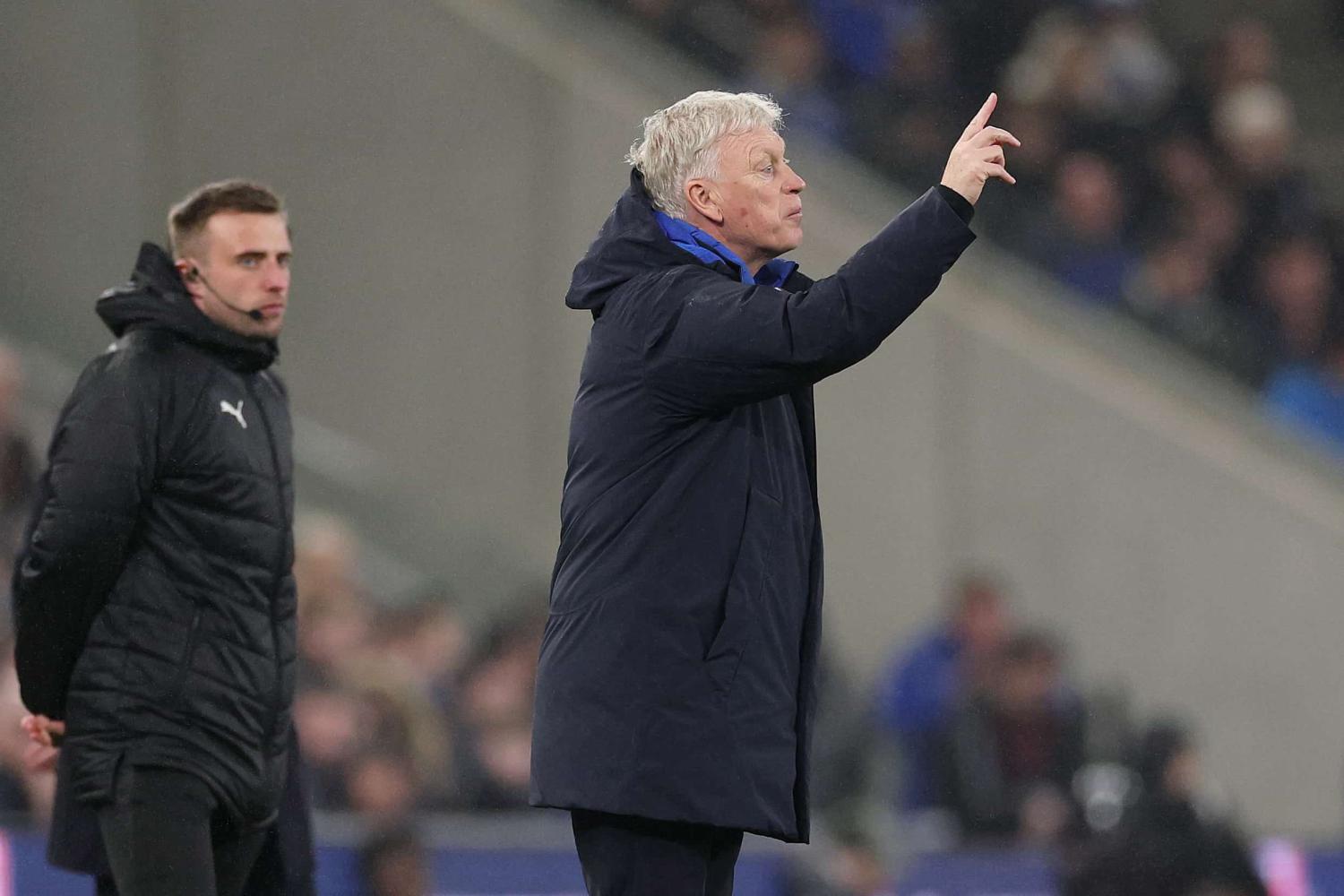Marksman Reborn
The Re-Emergence of Kevin Campbell
Walter Smith's ultimately unproductive reign as Everton manager may have
featured many flaws, but one of the enigmatic Scot's strengths was his ability
to spot a good signing. However, there were many Everton fans who were
beginning to doubt Smith's transfer policy back in 1999 when, with the transfer
deadline looming, he approached Turkish side Trabsonspor about the possibility
of taking former Arsenal and Nottingham Forest striker Kevin Campbell off their
hands. After all, what could a washed-up has-been, forced to ply his trade
in a relatively unknown league on the eastern fringe of Europe, possibly offer
an Everton side struggling to fend off the threat of relegation?
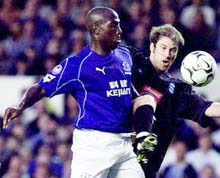
Kevin Campbell: Finally able to achieve full fitness, "Super Kev" is looking sharp once again
Little did the Blues fans know that 29-year-old Campbell would go on to score nine goals in as many games and almost single-handedly save the club from relegation, a fate which, after a gut-wrenching 2-1 defeat at the hands of Sheffield Wednesday — Campbell's home debut — had looked highly likely for Smith's team.
Perhaps equally surprising at that point would have been the notion that, within three years, Smith would be out of a job and Campbell would be heavily tipped for a cut-price move to either Aston Villa, West Bromwich Albion or Birmingham City. As unlikely as that seemed in the summer of 1999, the reality in 2002 was that, whether the speculation linking him to a transfer to the Midlands held any water or not, many fans felt that a move would have been the best thing for both Campbell and Everton Football Club, such was the level to which his career had sunk.
Just a few short months on, however, the man they dubbed "Super Kev" is a player reborn, putting three injury-ravaged seasons behind him. He has scored more Premiership goals in the first five games of the 2002/03 season than he managed in the entire 2001/02 campaign and looks sharper and fitter than he has in two years. Quite a turnaround for the 32-year-old whom many had written off because of a succession of long-term injuries during his time at Goodison Park.
Such was Campbell's impact during his explosive loan spell at the end of the 1998/99 season that Walter Smith had little option but to sign the striker on a permanent contract from Trabsonspor following protracted and occasionally bitter negotiations with the club that Campbell wanted nothing more than to leave. His dream return to the Premiership and escape from racial and personal abuse in Turkey came true with the conclusion of a £3M transfer in the summer of 1999.
At that point, things were looking very promising at Everton. Smith had guided the club to safety from relegation and was preparing to start his second campaign in charge, armed with a devastating new striking partnership in the form of Campbell and teenage sensation, Francis Jeffers. Indeed, it was to be Smith's best season at the Goodison helm; Everton finished 13th (although they would have achieved a top-half berth if they hadn't have lost to Middlesbrough on the final day of the season) playing perhaps the best football seen during the Walter Smith era. Campbell spent two long spells on the sidelines but still emerged as the team's top scorer with 12 goals in 26 games.
Unfortunately, his injury problems required surgery on his knee, putting him out of action throughout the summer and into the beginning of the 2000/01 season. In their infinite wisdom, Bill Kenwright and Walter Smith between them decided that bringing the perennially injured Duncan Ferguson back from Newcastle United would be a good solution to Campbell's absence.
Of course, Ferguson was injured in only the second game of the season and the Blues had to do without both him and Campbell until mid-September when the latter finally made his return to the starting line-up, seemingly with his injury problems behind him. However, Super Kev, having noticeably lost a yard in pace since his operation, was to be in and out of the side with niggling injuries over the next two seasons, but still managed to notch 10 goals in 27 games in 2000/01 and a disappointing 4 from 21 games in 2001/02.
Given the failings of Smith regime, the general desire for change, Campbell's noticeable decline in pace, fitness and scoring rate, and the fact that he had been signed on an enormous £5M contract, opinion among the supporters had shifted away from their former hero. He started to receive barracking from the stands during home games from impatient fans and a brief spate of racial incidents at away grounds involving Everton supporters gave rise to rumours that Campbell wanted to leave Goodison and start afresh somewhere else.
However, with Smith's departure in March 2002, the arrival of David Moyes and his subsequent reversal of the club's fortunes virtually overnight, the whole picture changed at Everton. Still, Campbell's continuing frustrations both on the pitch and on the treatment table meant that his name was high on the list of potential casualties of the new Moyes era, focused as it is on a more youthful approach.
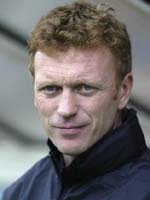
David Moyes: Goodison boss sees Campbell's value to grooming his more youth-oriented side.
Moyes, however, saw enormous value in Campbell's experience and ability and, as he assessed and improved the fitness entire squad, so Campbell was able to spend the summer of 2002 recuperating and rehabilitating so that he was ready for the start of the new campaign.
Moyes's faith has so far been repaid in abundance, with 6 goals from Campbell in the first nine games of the season and the 32-year-old striker is once again the darling of Goodison Park. For the first time in two years, "King Kev" is looking like the player who arrived in the spring of 1999 and blasted the Blues to Premiership survival with an average of a goal a game.
In retrospect, it's easy to see that Everton's almost perpetual injury crisis under Smith meant that Campbell was never really allowed to recover fully from his injuries or his surgery. Rushed back to first team action too soon, as so many players were, it's likely that he was never more than 75% fit — and his performances betrayed not his age and the loss of his touch, but purely the physical strains of a succession of injuries. Indeed, at one point during the 2001/02 season, a strong rumour circulated that a niggling back problem was about to end his professional career there and then.
Whether that rumour had any truth in it at the time or not, it is a credit to Campbell that he is back on form for the Blues, showing signs that he has regained his touch and his ability to be in the right place at the right time. His partnership with Tomasz Radzinski is also blossoming into a productive one and his ability to hold the ball up offers opportunities for the more attacking midfield players to get forward and try their luck in front of goal.
More than just a goalscorer, Kevin Campbell is also a fantastic role model for the emerging talent in Wayne Rooney, who will hopefully learn from his experienced teammate who is twice his age. While it may be too much to hope that the Blues' leading scorer can stay fit and healthy for the entire 2002/03 season, the team's success — which we might define as a Top 10 finish — may depend heavily on Super Kev's contribution on the front line. Not many people would have said that a few months ago.
Lyndon Lloyd - 3 October 2002


